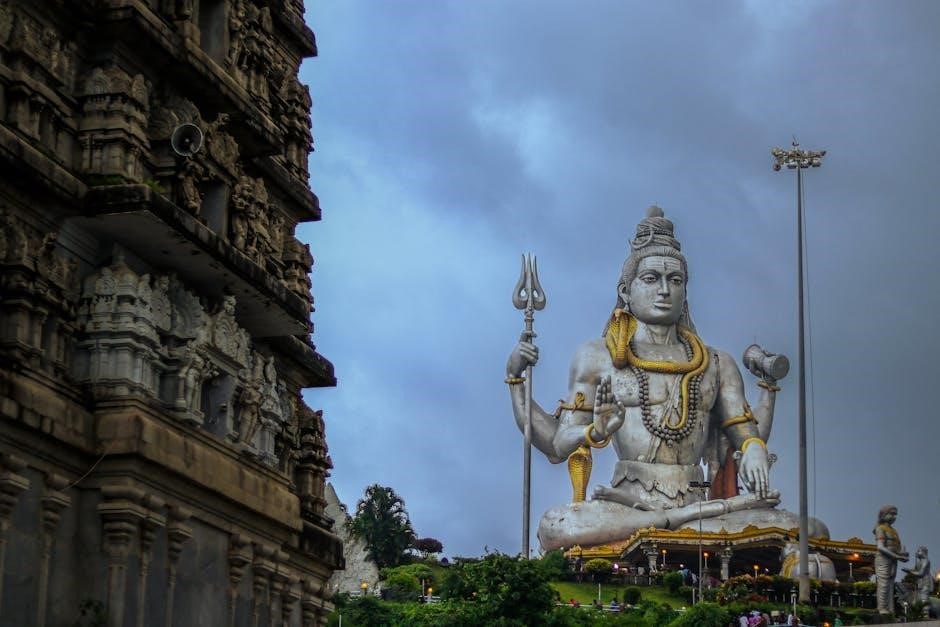shiva ashtothram in telugu pdf
The Shiva Ashtothram in Telugu PDF is a revered prayer featuring the 108 divine names of Lord Shiva‚ offering spiritual enlightenment and emotional solace to devotees.
Overview of Shiva Ashtothram
The Shiva Ashtothram is a sacred Hindu prayer consisting of 108 divine names of Lord Shiva‚ each carrying profound spiritual significance. It is a revered stotram that devotees chant to seek blessings‚ peace‚ and solace. The prayer is a part of Hindu worship and is often recited during rituals‚ ceremonies‚ and daily devotion. Each name in the Ashtothram highlights a unique attribute or power of Lord Shiva‚ reflecting his cosmic role as the destroyer‚ transformer‚ and benefactor. Chanting the Shiva Ashtothram is believed to bring spiritual growth‚ emotional balance‚ and solutions to life’s challenges‚ making it a cherished practice among Shiva devotees worldwide.
Significance of the Telugu Version
The Telugu version of Shiva Ashtothram holds immense cultural and spiritual significance‚ as it makes the sacred 108 names of Lord Shiva accessible to Telugu-speaking devotees. This adaptation ensures that followers can connect deeply with the prayer in their native language‚ fostering emotional and spiritual resonance. The Telugu translation preserves the essence and sanctity of the original Sanskrit text while catering to regional linguistic preferences. It serves as a bridge between ancient traditions and modern worship practices‚ enabling devotees to chant and reflect on Lord Shiva’s divine attributes with greater ease and understanding.

Structure and Content of Shiva Ashtothram
The Shiva Ashtothram is structured as a poetic hymn containing 108 names of Lord Shiva‚ each describing His divine attributes and sacred significance. The content is divided into verses‚ offering a systematic and reverent tribute to the deity‚ making it a comprehensive and meaningful devotional text for worshippers.
The 108 Names of Lord Shiva
The 108 Names of Lord Shiva are a sacred compilation of divine epithets‚ each reflecting His divine attributes‚ powers‚ and revered status. These names are derived from ancient scriptures and are considered deeply symbolic‚ capturing the essence of Shiva’s cosmic role as the destroyer‚ protector‚ and transformer. Each name carries profound spiritual significance‚ offering devotees a path to connect with the Almighty through chanting and meditation.
In the Telugu PDF version‚ these names are elegantly presented‚ preserving their original Sanskrit roots while adapting them into the Telugu language for regional devotees. This rendition ensures accessibility and cultural resonance‚ making the prayer a cherished part of daily worship and spiritual practices.
Meaning and Interpretation of the Names
Each of the 108 names of Lord Shiva holds profound spiritual and philosophical significance‚ reflecting His divine attributes‚ cosmic roles‚ and mythological tales. These names encapsulate His qualities as the destroyer of evil‚ the protector of the universe‚ and the embodiment of divine grace. Many names symbolize His transcendental nature‚ such as “Shiva” (the auspicious one) and “Maheshwara” (the great lord)‚ while others highlight His roles in creation and destruction. The interpretation of these names offers devotees a deeper understanding of His divine essence and inspires spiritual growth.
The Telugu version preserves the original Sanskrit meanings‚ ensuring that the cultural and spiritual essence remains intact. This adaptation makes the sacred names accessible to Telugu-speaking devotees‚ fostering a connection to Lord Shiva’s divine attributes and reinforcing their faith and devotion.

Downloading the Shiva Ashtothram Telugu PDF
The Shiva Ashtothram Telugu PDF is easily accessible online‚ offering a convenient way to obtain the sacred text for personal worship and chanting purposes.
Steps to Download the PDF
- Visit a reputable website like vignanam.org or stotranidhi.com.
- Search for “Shiva Ashtothram Telugu PDF” in the search bar.
- Select the appropriate link from the search results.
- Click the download button to initiate the PDF download.
- Wait for the download to complete and access the file in your downloads folder.
This process ensures easy access to the sacred text for spiritual practices.
Popular Websites for Download
Several trusted websites offer the Shiva Ashtothram Telugu PDF for free download. Vignanam.org and Stotranidhi.com are highly recommended for their authentic and user-friendly interfaces. Additionally‚ sites like OmTelugu.com and VaidikaVignanam.org provide reliable access to the PDF. These platforms ensure that the content is accurate and culturally significant‚ making them ideal for devotees seeking spiritual resources. They also offer additional features like MP3 versions and mobile app support‚ enhancing the overall experience for users.

Benefits of Chanting Shiva Ashtothram
Chanting Shiva Ashtothram brings spiritual peace‚ emotional balance‚ and mental clarity. It is believed to ward off negativity‚ enhance devotion‚ and strengthen the connection with Lord Shiva.
Spiritual Benefits
Chanting Shiva Ashtothram is believed to purify the soul‚ fostering a deep connection with Lord Shiva. It helps seekers attain spiritual enlightenment‚ wash away past sins‚ and gain divine blessings. Regular recitation strengthens faith‚ enhances meditation‚ and guides devotees toward self-realization. The 108 names symbolize the Lord’s infinite attributes‚ offering solace and spiritual growth. This sacred practice is considered a powerful tool for achieving inner peace and harmony in life. By chanting with devotion‚ one can experience profound spiritual transformation and draw closer to the divine essence of Lord Shiva.
Emotional and Mental Benefits
Chanting Shiva Ashtothram offers profound emotional and mental solace‚ calming the mind and soothing the heart. It helps alleviate stress‚ anxiety‚ and emotional turmoil‚ providing a sense of inner peace. The rhythmic recitation enhances mental clarity‚ focus‚ and stability‚ fostering a balanced emotional state. Devotees often experience a reduction in negative thoughts and an increase in positive energy. Regular practice strengthens emotional resilience‚ helping individuals cope with life’s challenges more gracefully. This sacred hymn is a powerful tool for emotional well-being‚ promoting harmony between the heart and mind while deepening one’s connection to spirituality.
How to Chant Shiva Ashtothram
Chanting Shiva Ashtothram involves reciting the 108 names with devotion and concentration. It is ideal to chant during early mornings or evenings‚ preferably after bathing. Sit in a peaceful environment‚ focus on the meaning of each name‚ and maintain a calm demeanor. Using the Telugu PDF as a guide ensures proper pronunciation and rhythm‚ enhancing the spiritual experience. Regular practice‚ with faith and dedication‚ amplifies its benefits and deepens the connection with Lord Shiva.
Best Time for Chanting
The ideal time for chanting Shiva Ashtothram is during the early morning hours‚ known as Brahma Muhurta‚ or in the evening after sunset. These periods are considered sacred and conducive to spiritual practices. Devotees are advised to bathe and wear clean clothes before beginning the chant. Sitting in a calm and serene environment‚ free from distractions‚ enhances the focus and devotion; Chanting during festivals like Maha Shivaratri or on days dedicated to Lord Shiva amplifies its spiritual significance. Consistency in timing helps maintain a disciplined practice‚ allowing for deeper meditation and a stronger connection to the divine energy of Lord Shiva.
Mantras and Pronunciation Tips
Chanting Shiva Ashtothram requires attention to proper pronunciation and devotion. Each mantra carries sacred significance‚ and accurate recitation ensures its spiritual efficacy. Devotees are encouraged to practice pronunciation using audio guides or under the guidance of a learned scholar. Maintaining a steady tone and rhythm enhances the meditative experience. Chanting with focus and intent allows for a deeper connection to the divine. It is also recommended to recite the mantras slowly‚ especially for beginners‚ to avoid errors. Regular practice helps in mastering the pronunciation‚ making the chanting more meaningful and impactful for spiritual growth.
Cultural and Religious Significance
The Shiva Ashtothram holds immense cultural and religious significance as a revered hymn in Hinduism‚ reflecting Lord Shiva’s divine attributes and fostering spiritual connection among devotees worldwide.
Role in Hindu Worship
The Shiva Ashtothram plays a vital role in Hindu worship‚ serving as a powerful devotional tool to invoke Lord Shiva’s blessings. It is often recited during pujas‚ rituals‚ and temple ceremonies to seek divine grace and prosperity. Devotees chant these 108 names to express reverence and connect spiritually with Shiva‚ believing it fosters inner peace and strength. The hymn is also integrated into daily worship routines‚ emphasizing its significance in maintaining spiritual equilibrium. Its recitation is considered auspicious during festivals like Maha Shivaratri‚ further highlighting its cultural and religious importance in Hindu traditions.
Use in Rituals and Ceremonies
The Shiva Ashtothram is an integral part of Hindu rituals and ceremonies‚ often recited during pujas‚ homas‚ and special occasions like Maha Shivaratri. It is believed to purify the environment and bring divine blessings. Priests and devotees chant these 108 names to invoke Lord Shiva’s grace‚ seeking spiritual growth and protection. The hymn is also used in marriage ceremonies‚ house-warming rituals‚ and other sacred events to ensure prosperity and harmony. Its recitation is considered a powerful way to connect with the divine‚ making it a cornerstone of Hindu religious practices and a means to attain peace and liberation.

Translation and Adaptation
The Shiva Ashtothram has been translated from Sanskrit to Telugu‚ retaining its spiritual essence. This adaptation serves as a bridge between cultures and languages‚ preserving its divine significance.
From Sanskrit to Telugu
The Shiva Ashtothram has been beautifully translated from Sanskrit to Telugu‚ ensuring the spiritual essence remains intact. This adaptation allows Telugu-speaking devotees to connect with the divine names of Lord Shiva. The translation process involved careful preservation of the original meaning while adapting it to the linguistic nuances of Telugu. It bridges the cultural gap‚ making the sacred 108 names accessible to a broader audience. The effort ensures that the spiritual significance and emotional resonance of the hymn are maintained‚ fostering devotion and faith among followers. This translation is a testament to the enduring relevance of Lord Shiva’s worship across languages and regions.
Challenges in Translation
Translating Shiva Ashtothram from Sanskrit to Telugu posed challenges‚ primarily in preserving the spiritual essence and linguistic nuances. Sanskrit’s complex grammar and poetic meter had to be adapted to Telugu’s script and rhythm without losing meaning; Maintaining the emotional and spiritual impact of the original text required careful selection of equivalent words. Additionally‚ cultural and religious contexts specific to Sanskrit needed to resonate in Telugu‚ ensuring devotees could connect deeply. Scholars faced the task of balancing fidelity to the source with the need for natural‚ fluent expression in Telugu‚ making the translation both authentic and accessible.
Additional Resources
Explore MP3 and audio versions of Shiva Ashtothram for chanting convenience. Discover mobile apps offering the Telugu PDF‚ lyrics‚ and audio recitations for a seamless spiritual experience.
MP3 and Audio Versions
For devotees seeking a convenient way to chant‚ MP3 and audio versions of Shiva Ashtothram in Telugu are widely available. These audio recitations provide clear pronunciation guidance‚ making it easier for followers to chant along devoutly. Many spiritual websites and mobile apps offer free downloads of these audio files‚ allowing seamless access for daily worship. Additionally‚ platforms like YouTube and devotional music apps feature high-quality recordings by renowned vocalists. These resources are particularly helpful for those who prefer auditory learning or wish to enhance their meditation practices with soothing chanting. They complement the PDF version‚ offering a multi-sensory approach to worship and contemplation.
Mobile Apps for Shiva Ashtothram
Several mobile apps now offer the Shiva Ashtothram in Telugu‚ catering to modern devotees. Apps like Vignanam and Stotranidhi provide easy access to the 108 names of Lord Shiva‚ along with audio and PDF versions. These apps often feature offline access‚ daily reminders‚ and customizable settings for a personalized worship experience. They also include lyrics‚ meanings‚ and pronunciation guides‚ making them ideal for both seasoned devotees and newcomers. By leveraging technology‚ these apps ensure that the sacred chanting of Shiva Ashtothram remains accessible and convenient for everyone‚ regardless of their location or schedule.
